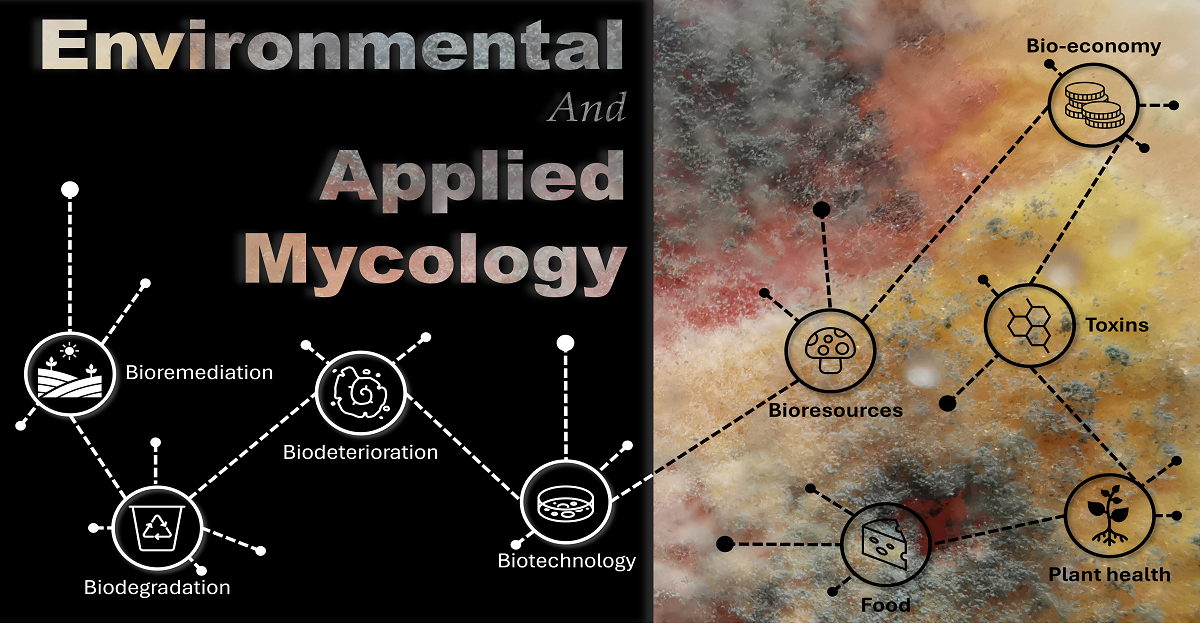Advances in Environmental and Applied Mycology
A special issue of Applied Sciences (ISSN 2076-3417). This special issue belongs to the section "Applied Biosciences and Bioengineering".
Deadline for manuscript submissions: 31 January 2026 | Viewed by 2027

Special Issue Editors
2. Fitolab, Laboratory for Phytopathology, Instituto Pedro Nunes, 3030-199 Coimbra, Portugal
Interests: mycology; biodeterioration; cultural heritage; genetics; phytopathology
Special Issues, Collections and Topics in MDPI journals
2. Fitolab, Laboratory for Phytopathology, Instituto Pedro Nunes, 3030-199 Coimbra, Portugal
Interests: biodeterioration of cultural heritage; culture-dependent methods; culture-independent techniques; fungi and biotechnology; plant pathology
Special Issue Information
Dear Colleagues,
Fungi, as incredibly versatile organisms with remarkable ecological and industrial significance, are increasingly recognized for their pivotal roles across diverse fields, making environmental and applied mycology a rapidly growing area of scientific exploration.
In natural environments, fungi drive essential processes such as nutrient cycling, organic matter decomposition, and symbiosis with plants, playing a crucial role in maintaining ecosystem function, stability, and biodiversity. Their unique metabolic capabilities make them valuable agents in bioremediation, where they break down pollutants and restore contaminated habitats. Fungi's adaptability to diverse terrestrial and aquatic environments, along with their complex interactions and symbiotic relationships, offers insights into their ecological importance. However, fungi's influence extends beyond their beneficial roles, presenting challenges as some species contribute to plant diseases or even material biodeterioration, damaging materials like wood, stone, and concrete, among others, and posing significant threats to both infrastructure and cultural heritage.
Applied mycology seeks to turn these natural processes into innovative, sustainable solutions. From enhancing soil fertility and managing pests in agriculture to advancing waste management through fungal decomposition and improving conservation and restoration strategies, mycology's applications are incredibly diverse. The dual role of fungi—as both enhancers of environmental health and contributors to decay and plant diseases—offers a rich array of research opportunities with profound implications for industry, agriculture, the environment, and the bioeconomy.
This Special Issue invites contributions that explore the multifaceted roles of fungi, their beneficial and detrimental impacts, and their innovative applications across agriculture and various industries. We cover a wide range of research topics, including applied mycology, environmental mycology, fungal diversity and evolution in specific and extreme environments, fungal biology and ecology, and fungal metabolites and toxins as antibiotics or with other practical applications, among others. Our goal is to highlight the latest research that bridges the gap between fundamental fungal biology and ecology and practical, real-world solutions.
Dr. António Manuel Santos Carriço Portugal
Dr. Diana Sofia Coutinho Silva de Paiva
Guest Editors
Manuscript Submission Information
Manuscripts should be submitted online at www.mdpi.com by registering and logging in to this website. Once you are registered, click here to go to the submission form. Manuscripts can be submitted until the deadline. All submissions that pass pre-check are peer-reviewed. Accepted papers will be published continuously in the journal (as soon as accepted) and will be listed together on the special issue website. Research articles, review articles as well as short communications are invited. For planned papers, a title and short abstract (about 100 words) can be sent to the Editorial Office for announcement on this website.
Submitted manuscripts should not have been published previously, nor be under consideration for publication elsewhere (except conference proceedings papers). All manuscripts are thoroughly refereed through a single-blind peer-review process. A guide for authors and other relevant information for submission of manuscripts is available on the Instructions for Authors page. Applied Sciences is an international peer-reviewed open access semimonthly journal published by MDPI.
Please visit the Instructions for Authors page before submitting a manuscript. The Article Processing Charge (APC) for publication in this open access journal is 2400 CHF (Swiss Francs). Submitted papers should be well formatted and use good English. Authors may use MDPI's English editing service prior to publication or during author revisions.
Keywords
- applied mycology
- environmental mycology
- fungal biodegradation and biodeterioration
- fungal bioremediation
- fungal biotechnology
- fungal bioresources
- fungi for food
- bioeconomy
- fungal metabolites and toxins
- plant health
Benefits of Publishing in a Special Issue
- Ease of navigation: Grouping papers by topic helps scholars navigate broad scope journals more efficiently.
- Greater discoverability: Special Issues support the reach and impact of scientific research. Articles in Special Issues are more discoverable and cited more frequently.
- Expansion of research network: Special Issues facilitate connections among authors, fostering scientific collaborations.
- External promotion: Articles in Special Issues are often promoted through the journal's social media, increasing their visibility.
- Reprint: MDPI Books provides the opportunity to republish successful Special Issues in book format, both online and in print.
Further information on MDPI's Special Issue policies can be found here.






